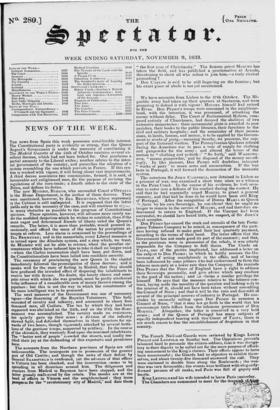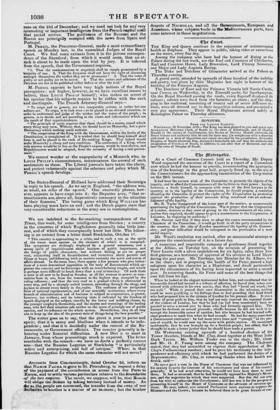The French - Nati mal Guards were reviewed by Kings LOUIS
PHILIP and LEOPOLD on Sunday last. The Opposition journals laboured hard to persuade the citizen-soldiers, that it was derogatory to their dignity to be called out for the mere purpose of affording amusement to the Kings visiters. Their efforts appear to have been unsuccessful ; the Guards had no objection to exhibit themselves, and about twenty-five thousand answered the call. They were stationed in double lines along the Boulevards ; the weather was very favourable; the streets were brilliant with elegantlydressed persons of all ranks, and Paris was full of gayety and bustle.
King LEOPOLD and his wife intended to leave Paris yesterday. The Chambers are summoned to Meet for the desp1ch _fi
ness on the 23d of December; and we need net look for an very interesting or importantiate/ligenee frem the fliench napital until that period arrives. The politicians of the Bureaus and the Bourse are princiRally ocoupied with the news from Spain and Portugal.
M. PERSIL, the Procureur-General, made a most extraordinary speech on Monday last, to the assembled Judges of the Royal Court. We find some extracts from it in the private correspondence of the Standard; from Which it would seem, that an attack is about to be made upon the trial by jury. It is inferred from the speech, that the Government requires, "1. That the condemnations or acquittals shall be simply pronounced by a 'Majority of one. 2. That the Jurymen shall not have the right of discussing amongst themselves the verdict they ate to pronounce ! 3. That the votes of guilty or not guilty are to be secret. 4. That the names and addresses of the Jurymen are not to be published either before or after the trial."
M. PERSIL appear's to have very high notions of the Royal prerogative : not higher, however, as we have excellent reason to believe, than Louis PHILIP himself; who makes no secret of his opinion that his subjects require 'to be ridden with the curb and martingale. The French Attorney-General says " To reign and to govern, are two inseparable actions, or rather but one solitary act. To reign, is to look over—to be placed in an elevated situation, in order to understand and judge of the wishes and the wants of the people ; to govern, is to decide and act according to the views and information which are
the result of that superintendence "The principle of unity requires that there should be a centre, round which
every thing may turn. Without that, we should have no Monarchy, but a pure•Democracy which nothing could restrain. . . .
"The cooperation of the King with the Government, within the limits of the Constitution, is complained of. It is wished that he should keep himself aloof from it, and be placed in the rank of Do-nothing Kings. That indeed would make Monarchy a cheap and easy condition. The uselessness of a King, whose only mission would be to live at the People's expense, would be soon shown, and Republicanism would be adopted, from the necessity of having a real government."
We cannot wonder at the unpopularity of' a Monarch who, in Louis PHILIP'S circumstances, countenances the avowal of such sentiments as these. The Liberal journals have taken the alarm, and protest vehemently against the schemes and policy which M. PERSIL'S speech develops.





















